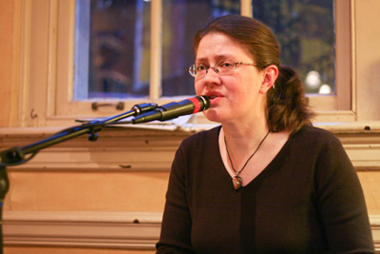Lora Steiner
When participants gathered in suburban Philadelphia, for the 2007 Emergent Conversation, they were surprised at how many Mennonites were a part of the group. For Jess Walter, who works with Franconia Mennonite Conference, the reason was obvious: a combination of her job, a personal interest in postmodernity and faith, and a desire to show hospitality were all motivated her to join the event.

“I told them,” said Walter, who helped to coordinate part of the gathering, “You were on our turf!” Most of Franconia Conference’s 41 member congregations are located in the Philadelphia region.
Nearly 150 people joined the conversation, held from April 16 to 18 on the campus of Eastern University and at a nearby church. Coordinated by Emergent Village, it’s referred to as a “conversation”—as opposed to a conference—as a way to set an informal tone and invite participation from all levels.
Emergent Village is about ten years old and best characterized, according to national coordinator Tony Jones, as a relational network of friends. Emergent Village is definitely not a denomination, says Jones, but rather focuses its work on bringing together those interested in the emerging church, as well as organizing conferences and publishing books.
Some of the Mennonites present at the gathering, like Tim Stair, were there as official representatives of their local conferences and of Mennonite Church USA (MC USA). Others, such as Mark Van Steenwyk of Minneapolis, Minn., came representing emerging Mennonite congregations.
Van Steenwyk’s church, Missio Dei, began nearly two-and-a-half years ago in the West Bank neighborhood of Minneapolis, an ethnically diverse area with a high level of poverty. A year after the church began, members began to explore how they could be more hospitable and present in the community around them. They also realized they wanted to be a part of a larger Anabaptist-minded community, and approached the Central Plains Conference about joining MC USA.
“We are very Anabaptistic at Missio Dei,” says Van Steenwyk. “We feel that we need to submit to some larger community so that we don’t get it into our heads that we’re doing this alone, or that we can simply pick and choose what we want to do as a group of ‘consumers.'”
Topher Maddox, who works at Spruce Lake Retreat in Candensis, Pennsylvania, has had a similar experience. His congregation, “NewStart,” grew out of what was Spruce Lake Fellowship. Within the last few years, though, as the area around Spruce Lake and the Poconos began to change rapidly, church members recognized the need to move out into the community.
“We felt the old structure and some of the traditions [of our church] need to be put to rest,” said Maddox, “In order to make a new, fresh start.”
For others, it was their first exposure to the emerging church movement. Hinke Loewen-Rudgers of Winnipeg, Manitoba, was a first-time participant who found the time to be both interesting and educational.
“It’s important for Mennonites to be in conversation [about] what it means to be Mennonite and Christian in our world today,” said Loewen-Rudgers, who works with Mennonite Church Canada. “It’s only in conversation and engagement with others that our own faith journey really makes a difference to the local and global community.”
Jess Walter agreed.
“If we are going to be missional Christians, our churches are going to be constantly emerging, constantly in the process of new formation and rethinking,” she said. Walter hopes that building relationships with others who are Anabaptist-oriented might help the Mennonite church learn more about itself. “Welcoming those outside of our heritage who align with our theology can help us to learn what is theology and what is ethnic about who we are as Mennonites and teach us about the unintentional walls our culture has created.”
Stair, who also came as a representative of Indiana-Michigan Conference, found that much of the theology he heard—such as an emphasis on love of enemy as central to the Gospel—is closely aligned with Anabaptist theology. Stair says he came partly because of his
commitments to the denomination, but also because out of personal interest.
“I think we’re living in a time where we need to find some different ways to be church,” he said.
While the theme of this year’s conversation was philosophy and theology, the event gave participants an opportunity to network and explore what they’ve learned in their own churches.
Van Steenwyk says he counts himself among a growing number of young Anabaptists who are anxious to both live and proclaim the Gospel of Jesus. “We want a Christianity centered around the Sermon on the Mount. The Mennonite Church has generations of thought, dialogue, and action that I desperately want to explore.”
“On the other hand,” he added, “I’d like to think that folks like me have something to contribute, as well. We have creative ways of thinking about [the nature of church] and mission—ways of embodying an Anabaptist ethic—that resonate with our emerging culture.”
Photo Caption: Heather Kropf of Pittsburgh performed at The Gryphon, a coffeehouse in St. David’s PA, in an event sponsored by Franconia Mennonite Conference concurrent with the Emergent Village Conversation.
The opinions expressed in articles posted on Mosaic’s website are those of the author and may not reflect the official policy of Mosaic Conference. Mosaic is a large conference, crossing ethnicities, geographies, generations, theologies, and politics. Each person can only speak for themselves; no one can represent “the conference.” May God give us the grace to hear what the Spirit is speaking to us through people with whom we disagree and the humility and courage to love one another even when those disagreements can’t be bridged.
